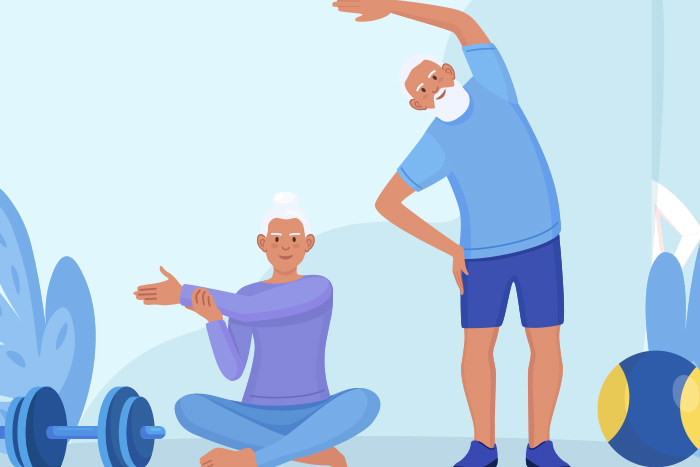Living with chronic obstructive pulmonary disease (COPD) can be challenging, but it doesn’t have to slow you down. COPD is a long-term lung disease that makes it hard to breathe, and many people don’t fully understand how to manage it. While there’s no cure for COPD, there are plenty of ways to feel better and breathe easier every day. Small lifestyle changes can add up to big improvements in your comfort and health.
The Best Breathing Exercises for COPD
Breathing exercises are one of the simplest and most helpful things you can do to manage COPD. They help strengthen your lungs and make breathing feel easier. Here are two that are especially useful:
Pursed-Lip Breathing: Breathe in slowly through your nose, then gently breathe out through pursed lips (like you're blowing out a candle). This keeps your airways open longer and helps get rid of trapped air.
Diaphragmatic Breathing: Place one hand on your chest and the other on your belly. As you breathe in through your nose, try to make the hand on your belly rise more than the one on your chest. This helps your lungs fill up more fully.
Practicing these a few times a day—even just for five minutes—can help you feel less short of breath.
Easy Ways to Stay Active Without Getting Too Tired
Exercise might sound hard when you already feel winded, but regular movement actually helps your lungs work better over time. The key is to go slow and listen to your body. Here are some senior-friendly activities that are safe for people with COPD:
Walking: A short walk each day, even indoors, helps keep your muscles strong and your lungs active.
Stretching: Gentle stretching improves flexibility and makes it easier to move and breathe.
Chair Exercises: You can do arm raises, leg lifts, and light stretches while sitting down to avoid getting too tired.
Remember, it’s okay to take breaks. The goal is to keep moving, not to wear yourself out. Talk to your doctor before starting anything new.
If you’re overweight, losing some weight can make it easier to breathe—especially when you’re moving around or being active. For some people, joining a weight loss program can provide the support and structure they need to stay on track.*
How to Make Your Home COPD-Friendly
Your home should be a safe and easy place to breathe. A few simple changes can make a big difference:
Reduce Dust and Allergens: Use a HEPA air filter and vacuum regularly with a filter-equipped vacuum.
Avoid Strong Smells: Skip scented candles, air fresheners, and harsh cleaning sprays that can irritate your lungs.
Control Indoor Humidity: Keep humidity between 30% and 50% to avoid mold and make breathing more comfortable.
Stay Smoke-Free: If you or someone in your home smokes, quitting is one of the best things you can do for your lungs.
Making your living space cleaner and calmer supports better breathing and can help prevent flare-ups.
Develop Good Sleeping Habits
Getting good sleep is often overlooked, but it’s a big part of staying healthy with COPD. Poor sleep can increase the risk of flare-ups and make you feel more tired and short of breath during the day. Here are some tips to help you rest better:
Stick to a Routine: Try to go to bed and wake up at the same time each day—even on weekends. This can help your body get into a rhythm around sleep.
Keep Your Bedroom Cool, Dark, and Quiet: A calm sleeping space can help your body relax.
Avoid Big Meals or Caffeine Before Bed: These can make it harder to fall asleep.
Use Extra Pillows if Needed: Sleeping with your head elevated may make breathing easier at night.
If you often wake up coughing or short of breath, talk to your doctor. Better sleep means more energy and fewer flare-ups.
The Importance of Mental Health and COPD Support Groups
COPD can affect more than just your body—it can also take a toll on your mood. Feeling tired, limited, or anxious is common, but you don’t have to go through it alone.
Talk About How You Feel: Share your concerns with your doctor or a counselor. Sometimes, just talking can help lighten the load.
Join a COPD Support Group: Meeting others who understand what you’re going through can be comforting and inspiring. Support groups are often available in person or online.
Practice Relaxation: Try simple activities like listening to music, meditating, or doing some deep breathing to help you stay calm and centered.
Taking care of your mental health is just as important as managing your physical symptoms.
Small Steps to Breathing Easier With COPD
Managing COPD is about more than just medication—it’s about building healthy habits that make breathing easier day by day. With the right exercises, home setup, and emotional support, you can take back control and enjoy more good days.
Start with one small change, and keep building from there. Your lungs—and your whole body—will thank you.
Sources:
National Heart, Lung, and Blood Institute: What Is COPD?
Harvard Health: Poor sleep heightens risk of COPD flare ups
Mayo Clinic: COPD
*Disclaimer: Healthcare Select may earn a commission if you purchase a product or service through links to our partners. This comes at no extra cost to you.

